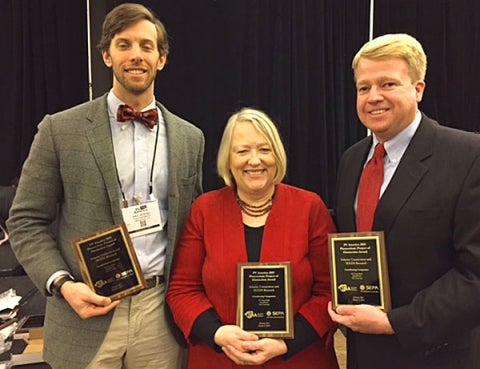Note: Yale School of the Environment (YSE) was formerly known as the Yale School of Forestry & Environmental Studies (F&ES). News articles and events posted prior to July 1, 2020 refer to the School's name at that time.
 Will Murtha ’16 M.E.M., left, with Kate Donnelly and Brian F. Keane of SmartPower.
Will Murtha ’16 M.E.M., left, with Kate Donnelly and Brian F. Keane of SmartPower.
A Connecticut-based partnership and major Yale research project led by Kenneth Gillingham, associate professor at the Yale School of Forestry & Environmental Studies (F&ES) have received a national award for innovative research that has increased adoption of residential solar power in the state.
Solarize Connecticut, which is spearheaded by the Connecticut Green Bank and is part of the U.S. Department of Energy’s Solar Energy Evolution and Diffusion Studies (SEEDS) program, this week received the 2015 Project of Distinction Award from the Solar Energy Industries Association (SEIA) and the Solar Electric Power Association (SEPA).
The award honors projects that are driving the success and expansion of the solar energy sector.
The project is an example of collaboration between industry, government, and academia to better understand the factors that drive people to adopt rooftop solar photovoltaic systems. The research group includes 12 members of the Yale community, including faculty, staff, postdoctoral associates, and students from F&ES and the Yale School of Management. In addition to the Connecticut Green Bank, partners include Duke University and SmartPower, a nonprofit marketing firm.
“From providing a great educational opportunity for our student team at Yale to promoting cutting-edge research to truly helping Connecticut residents make an impact in meeting the state’s renewable energy goals, this collaborative project has been an unquestionable success,” said Gillingham. “We couldn’t be more happy to receive this recognition from PV America.”
Solarize relies on an on-the-ground outreach campaign that helps educate consumers while simultaneously creating awareness, and walks the consumer all the way from awareness about solar to actually purchasing it. In Connecticut, more than 2,000 residential homes have adopted solar power as a result of the Solarize campaign.
Supported by a grant from the U.S. Department of Energy, the research project explores how well a variety of novel behavioral strategies work in accelerating solar diffusion — and why.
The Yale research team includes students Sabrina Szeto ’16 M.E.M., Will Murtha ’16 M.E.M, Amir Chireh Mehr ’07 M.E.M./M.B.A., Emily Grady, ’15 M.E.M., Lea Lupkin ’16 M.E.M., Marissa Galizia ’15 M.E.M./M.B.A., and Sophia Luo ’15 M.E.M.; postdoctoral associates Tsvetan Tsvetanov and Stefan Lamp; and Stuart DeCew and Jennifer Rogan, program director and associate director of the Yale Center for Business and the Environment (CBEY), respectively.
“This award is a testament to the success of a Solarize program that is transforming the solar landscape in Connecticut,” said Murtha, a research assistant for the SEEDS project. “I was excited to witness the extent to which the solar industry has taken note of our research. It was an honor to represent the Yale team and receive the award alongside our partners at Connecticut’s Green Bank, SmartPower, and Duke University.”
Solarize Connecticut, which is spearheaded by the Connecticut Green Bank and is part of the U.S. Department of Energy’s Solar Energy Evolution and Diffusion Studies (SEEDS) program, this week received the 2015 Project of Distinction Award from the Solar Energy Industries Association (SEIA) and the Solar Electric Power Association (SEPA).
The award honors projects that are driving the success and expansion of the solar energy sector.
The project is an example of collaboration between industry, government, and academia to better understand the factors that drive people to adopt rooftop solar photovoltaic systems. The research group includes 12 members of the Yale community, including faculty, staff, postdoctoral associates, and students from F&ES and the Yale School of Management. In addition to the Connecticut Green Bank, partners include Duke University and SmartPower, a nonprofit marketing firm.
“From providing a great educational opportunity for our student team at Yale to promoting cutting-edge research to truly helping Connecticut residents make an impact in meeting the state’s renewable energy goals, this collaborative project has been an unquestionable success,” said Gillingham. “We couldn’t be more happy to receive this recognition from PV America.”
Solarize relies on an on-the-ground outreach campaign that helps educate consumers while simultaneously creating awareness, and walks the consumer all the way from awareness about solar to actually purchasing it. In Connecticut, more than 2,000 residential homes have adopted solar power as a result of the Solarize campaign.
Supported by a grant from the U.S. Department of Energy, the research project explores how well a variety of novel behavioral strategies work in accelerating solar diffusion — and why.
The Yale research team includes students Sabrina Szeto ’16 M.E.M., Will Murtha ’16 M.E.M, Amir Chireh Mehr ’07 M.E.M./M.B.A., Emily Grady, ’15 M.E.M., Lea Lupkin ’16 M.E.M., Marissa Galizia ’15 M.E.M./M.B.A., and Sophia Luo ’15 M.E.M.; postdoctoral associates Tsvetan Tsvetanov and Stefan Lamp; and Stuart DeCew and Jennifer Rogan, program director and associate director of the Yale Center for Business and the Environment (CBEY), respectively.
“This award is a testament to the success of a Solarize program that is transforming the solar landscape in Connecticut,” said Murtha, a research assistant for the SEEDS project. “I was excited to witness the extent to which the solar industry has taken note of our research. It was an honor to represent the Yale team and receive the award alongside our partners at Connecticut’s Green Bank, SmartPower, and Duke University.”
Why Solar Adoption Can Be Contagious
 In a recent study, F&ES Professor Kenneth Gillingham found that solar adoption rates depend less on wealth or population size, and more on whether your neighbors decide to go solar. <strong><a href="http://environment.yale.edu/news/article/why-solar-adoption-can-be-contagious/">Read more</a></strong>.
In a recent study, F&ES Professor Kenneth Gillingham found that solar adoption rates depend less on wealth or population size, and more on whether your neighbors decide to go solar. <strong><a href="http://environment.yale.edu/news/article/why-solar-adoption-can-be-contagious/">Read more</a></strong>.
Published
March 10, 2015